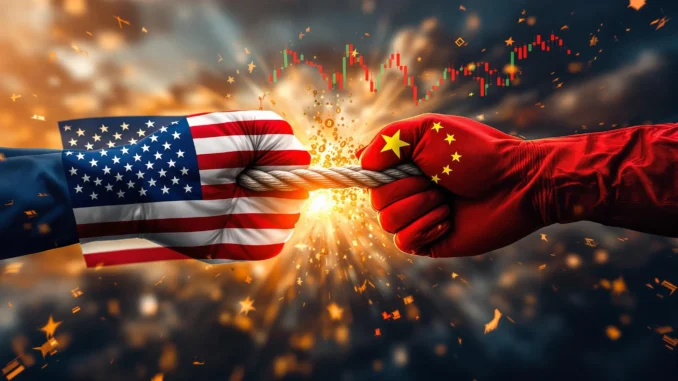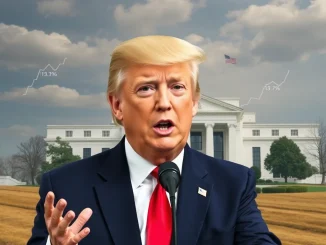
Hold onto your hats, crypto enthusiasts! The economic landscape just shifted again. In a move that has sent ripples through global markets, former U.S. President Donald Trump has announced a fresh 10% tariff on goods imported from China. This news, breaking via Watcher.Guru on X, signals a potential re-escalation of trade tensions between the world’s two largest economies. But what does this mean for the volatile world of cryptocurrency? Let’s dive into the potential fallout and explore how this could impact your crypto portfolio.
Decoding the Trump Tariff: What’s Actually Happening?
So, what exactly did Trump announce? According to reports, the former president stated his intention to impose a 10% tariff on all goods imported from China if he is re-elected. This isn’t just a minor adjustment; it’s a significant escalation that could reignite the US-China trade war. To understand the gravity, let’s break it down:
- The Announcement: Donald Trump, as reported by Watcher.Guru, declared a new 10% tariff on Chinese imports.
- Scope: This tariff is proposed to apply to all goods coming from China, a vast range of products from electronics to consumer goods.
- Context: This action comes after a period of relative calm in US-China trade relations, suggesting a potential return to protectionist policies.
- Market Reaction: While the immediate impact on traditional markets is being assessed, the crypto market, known for its sensitivity to global economic shifts, is likely to react.
Why is this announcement significant? The U.S. and China are deeply intertwined economically. Tariffs act as taxes on imported goods, making them more expensive for domestic consumers and businesses. This can lead to:
- Increased Costs: American businesses importing Chinese goods will face higher costs, potentially passing these on to consumers.
- Retaliation: China could retaliate with tariffs on U.S. goods, leading to a tit-for-tat trade war.
- Economic Slowdown: Trade wars can disrupt supply chains, reduce business investment, and contribute to economic slowdowns.
- Market Volatility: Uncertainty and fear surrounding trade tensions often lead to increased volatility in financial markets, including crypto.
How Could the China Import Tax Impact the Crypto Market?
Now, let’s get to the burning question for crypto enthusiasts: how does a China import tax affect the digital asset space? While seemingly unrelated at first glance, global economic events often have a ripple effect on the crypto market. Here’s how:
- Risk-Off Sentiment: Trade wars create economic uncertainty. In times of uncertainty, investors tend to move away from riskier assets. Cryptocurrencies, still considered a relatively high-risk asset class, could see investors pulling back, leading to potential price drops.
- Inflationary Pressures: Tariffs can contribute to inflation by increasing the cost of goods. While some argue Bitcoin is an inflation hedge, broader inflationary pressures can also lead to tighter monetary policies by central banks, which can negatively impact all asset classes, including crypto.
- Supply Chain Disruptions: Global supply chains are already fragile. Escalating trade tensions can further disrupt these chains, impacting various industries, including those indirectly related to crypto mining and technology.
- Safe Haven Appeal (Potentially): In times of economic turmoil, some investors may seek safe haven assets. While gold has traditionally played this role, Bitcoin is increasingly being considered as a digital alternative. However, this “safe haven” narrative is still evolving, and the immediate reaction might be risk aversion.
- Geopolitical Uncertainty and Capital Flows: Trade wars are inherently geopolitical events. Increased tensions between the US and China could lead to shifts in capital flows. How this directly impacts crypto is complex, but it could influence investment decisions and market sentiment.
Navigating the US China Trade War: What Should Crypto Investors Do?
So, with the potential for a renewed US China trade war looming, what are some actionable insights for crypto investors? It’s crucial to remember that this is a developing situation, and market reactions can be unpredictable. However, here are some strategies to consider:
- Stay Informed: Keep a close eye on developments related to the tariffs and the broader economic response. Reputable news sources and crypto market analysis platforms are your best friends.
- Diversify Your Portfolio: Diversification is always a good strategy, especially in volatile times. Don’t put all your eggs in one crypto basket. Consider a mix of different cryptocurrencies and potentially other asset classes.
- Manage Risk: Understand your risk tolerance. If you’re risk-averse, consider reducing your exposure to crypto in the short term or employing risk management tools like stop-loss orders.
- Long-Term Perspective: Remember that the crypto market is known for its long-term potential. Short-term volatility due to geopolitical events might present buying opportunities for long-term holders.
- Research and Due Diligence: Before making any investment decisions based on news events, always do your own research. Understand the projects you’re investing in and their potential resilience to economic shocks.
The Broader Global Economy and Crypto’s Place
The announcement of a new Trump tariff China policy isn’t just about bilateral trade; it’s about the health of the global economy as a whole. A trade war between the US and China, the world’s two largest economies, can have far-reaching consequences, impacting global growth, inflation, and investor sentiment. In this interconnected world, the crypto market is not immune.
Consider these broader economic implications:
| Economic Factor | Potential Impact on Crypto |
|---|---|
| Global Economic Slowdown | Risk-off sentiment, potential decrease in investment in risk assets like crypto. |
| Inflationary Pressures | Uncertain impact – could be seen as a hedge by some, but broader inflation can lead to tighter monetary policy, negatively impacting markets. |
| Supply Chain Disruptions | Indirect impacts on crypto mining and technology infrastructure. |
| Geopolitical Instability | Increased market volatility, potential shifts in capital flows. |
Is This a Crypto Crash Catalyst or a Buying Opportunity?
The million-dollar question: is this tariff announcement a trigger for a crypto crash, or does it present a unique buying opportunity? The answer, as always in the crypto world, is complex and depends on various factors.
Bearish Scenario (Crash Catalyst?):
- Increased risk aversion leads to a broad market sell-off, including crypto.
- Economic uncertainty dampens investor enthusiasm and capital inflow into crypto.
- Negative sentiment spreads, triggering further downward pressure on prices.
Bullish Scenario (Buying Opportunity?):
- Short-term panic creates temporary price dips, offering a chance to buy crypto at lower prices for long-term gains.
- Bitcoin’s safe haven narrative gains traction as traditional markets face turmoil.
- Long-term investors see this as noise and continue to accumulate crypto, unfazed by short-term volatility.
Ultimately, the market’s reaction will depend on investor sentiment, the severity of the trade tensions, and the broader economic context. It’s a time for caution, informed decision-making, and perhaps, strategic patience.
Final Thoughts: Navigating Crypto in a Tariff-Torn World
Donald Trump’s announcement of a 10% tariff on China has injected a fresh dose of uncertainty into the global economic landscape. For the cryptocurrency market, this development is a significant event to watch closely. While the immediate reaction might be volatility and risk aversion, it also presents opportunities for informed investors who understand the long-term potential of crypto and can navigate short-term market fluctuations. Stay vigilant, stay informed, and always remember to do your own research in this ever-evolving world of crypto and global finance.



